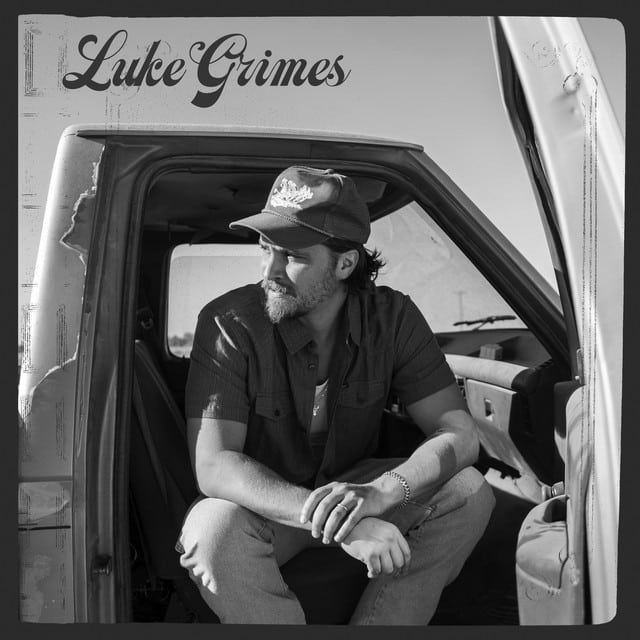Released: 2024
Label: UMG Nashville
Bust out the air guitars and prepare to nod your heads to the rhythm folks, as we’re about to dive deep into the self-titled album of alt-country singer-songwriter Luke Grimes. Released in 2024 by UMG Nashville, this record revels in its tantalizing cocktail of dusty highways, dusky saloons, and honest heartbreak. Harnessing a sonic palette that’s as expansive as the American landscape, Grimes unfurls his musical narrative across thirteen tracks that are as diverse as they are relatable.
Within the grooves of this album, you’ll find a rich tapestry of Americana and roots rock stitched together with Grimes’ soulful, gritty vocals. From the anthemic opener “Burn” to the introspective closer “Worst Of Me”, this album oscillates between fiery rockers and intimate ballads, each track brimming with emotional resonance. Delve into the haunting echoes of “Ghost Of Who We Were”, ride along the rolling rhythm of “South On 75”, or find solace in the spiritual reflections of “God And A Girl”. Every song here is a testament to Grimes’ ability to balance heartfelt lyrical content with infectious melodies.
So let’s get into it. From the blazing embers of “Burn” to the self-examining shadows of “Worst Of Me”, we’re breaking down the album “Luke Grimes” by Luke Grimes, track for track, diving deep into the layers of this Americana masterpiece. Whether you’re a long-time fan or a recent convert, buckle up for an exciting exploration into the sonic highways of this truly unique album.
1 Burn
With lines like “When I wind up hurt, know the fault’s all mine,” Grimes both acknowledges his reckless pursuit and absorbs the impending heartache. His proclamation, “Let it burn, ‘Til I’m a pile of ashes smokin’ on your good night dirt,” embodies the scorched-earth atmosphere of an emotion-filled combustion in potent, element-scorching verbiage. He’s not just accepting the burn, but rather welcoming it, bold in its inevitability. Grimes’ lyrics echo the sentiments of heartbreak — bittersweet yet beautiful, tragic but transformative. More than just an ode to lost love, “Burn,” in its molten rhythm and soulful narrative, allows us to feel the heat, taste the ashes, and revel in the stormy glory of an intensified heartbreak.
2 Playin’ On The Tracks
“No, I’ll never grow up, I’ll never slow down, if you can’t hear the train whistle, listen up, ’cause it’s leavin’ town,” he sings, with a raw ferocity and steadfast determination that’s both infectious and commanding. This line paints a picture of live-wire motion, of heading headfirst into the unknown with an unquenchable fire burning in one’s belly. Notice how the track taps into the imagery of trains and tracks—a symbol for life’s relentless, relentless rush forward. In this song, Grimes isn’t just strumming chords; he’s sounding out the pulse of a life lived full throttle, defying convention, and painting a sonic landscape that’s gritty, raw and absolutely electrifying.
3 Hold On
The raw lyricism unveils a person grappling with feelings of impermanence, painted vividly in the line, “I always leave before the curtain hits the floor, Lord.” The song serves as a plea for understanding, exposing the difficulty of maintaining composure in the face of emotional distress. With biting lines like “Maybe you and I wouldn’t make it, It ain’t the kind of risk I’m taking,” Grimes touches upon aspects of one’s inner turmoil and fear of commitment. The repetition of “Hold on, hold on” signifies the struggle of grappling and letting go. All in all, “Hold On” is a testament to Grimes’ ability to churn out rock ballads laden with raw emotions and introspective narratives.
4 Black Powder
It’s edgy, it’s rock ‘n’ roll; it’s the sound of a man living on the edge who wants his lover to join him there – “Light it up, baby, turn it up louder / Light me up like black powder.” The lyrics paint an electrifyingly vivid picture: a good guy who’s done it again, a good girl who’s challenging him, their intense relationship likened to the volatile combination of flame and black powder. He’s not begging, but he’s on his knees – his vulnerability is palpable. The chorus is a relentless chant, a plea for intensity, for feeling, for all-consuming passion. “Sky-high, can’t come down / Need your nicotine, breathe it in ’til I feel it.” This is the stuff classic rock is made of.
5 Ghost Of Who We Were
There’s vivid imagery of changed landscapes, empty houses, and silenced music, all tied into a potent exploration of memory and loss. Standout line, “But all I see is the ghost of who we were,” is a chilling portrayal of the protagonist’s struggle to let go, his world haunted by the specter of what was. The ever-present question, “Are you happy? Do you miss me? Are you dancin’ with our memory?” is a refrain of regret, unanswered questions, and unresolved feelings. The song portrays a poignant, raw portrayal of emotional turmoil, a man gracefully grappling with lingering pain and the accompanying ghost that refuses to die.
6 Oh Ohio
The track is laden with poignant lines reflecting on change — a powerful one being “Did someone steal your sunshine? Have you always been this grey?” This reference suggests a melancholic transformation, as if this once vibrant place has been drained of its life. The chorus offers another metaphorical gut-punch, “When you’re forgetting me, crucify my memory, Just know I’ll bleed, Ohio,” hinting at a painful departure. The singer acknowledges and contrasts what Ohio used to be versus what it is now, with lyrics like “I remember you, The way you used to be, Before they parked the trains on the tracks, and the parking lots grew weeds.” The song ultimately emphasizes a sentiment of change and the inevitable progression of time.
7 God And A Girl
With a raw admission like, “I tell her ’bout days chasin’ highs to come down, Hittin’ rock bottom just to find solid ground,” one gets a vivid glimpse of Grimes’ turbulent past. Despite these seemingly insurmountable struggles, Grimes introduces a beacon of hope—both divine and human, “She leads me to Jesus, loves me like hell, Keeps me believin’ in more than myself.” It’s an almost biblical narrative of salvation, of being pulled back from the precipice by belief and profound, unconditional love—potent stuff indeed. This tune explores the intersection of faith and love, an unabashed appreciation for the redemptive power of a woman’s love and God’s boundless grace—two fierce shiny lights in the dark labyrinth of Grimes’ travels. “I finally found what I never knew I need in this world, God and a Girl”- a potent admission of his saving graces.
8 What Angels Do
He confesses to feeling undeserving and lost, with the profound line, “I’m always wondering where I went right, After all the wrong turns that I made”. The song is a beautiful confession of gratitude for an undeserving love that the singer describes as angelic, a sentiment echoed in the potent line, “Never prayed all that much, wasn’t too big on love, Now I’m thanking my lucky stars up above.” Grimes deftly intertwines the language of religion with expressions of love. He captures the enduring patience and presence of this love in the refrain, “Keep waiting on the day for you to fly away, And put those wings to good use, But that ain’t what angels do.” It’s a lyrical masterpiece of love and devotion rolled in one.
9 No Horse To Ride
It’s as if every line of the lyrics is a confession of despair. Exemplified by the standout verse, “Without you, I’d be a fallin’ star without a midnight sky – A cowboy with no horse to ride”, Grimes perfectly captures the debilitating desolation that comes from yearning for an absent love. The mention of a “drunk without a drink to drink” and a “guitar with a broken string” serves as poignant symbols of the emptiness and desolation that ensues when the heart yearns for what it cannot have. Grimes’ lyrics are so easy to relate to, yet provoke profound thoughts about love and loss, making “No Horse To Ride” a distinct gem in his self-titled album.
10 Wait For The Rain To Die Down
Luke Grimes bares his resilience with lyrics like “Yeah, but my kind don’t give up”, seemingly an affirmation of his unwavering commitment amidst turmoil. The storm here is a metaphor for a strained relationship, with Grimes presenting himself as the sturdy harbor, ready to weather the storm. His offer, “Fall into my arms and we’ll wait for the rain to die down,” is a tender display of loyalty and patience; a promise that all turmoil is temporary and that peace will come with the dawn: “I’ll be laying here still beside you when the sun comes out.” The juxtaposition of the hurricane’s chaos and the calm heartbeat sound serves as an emotional rollercoaster ride, echoing the highs and lows of any real, passionate relationship, resonating deeply with listeners.
11 Ain’t Dead Yet
Demonstrating the rough-hewn charm of Dylan, yet adorned with the raw, emotional honesty of Springsteen, Grimes colors the tune with grizzled phrases, an anthem of undying love. “I’m gonna love you ’til I die, and I ain’t dead yet,” he croons, a proclamation that soaks into every pore of the track, delivering a punch as potent as any power chord. The beauty of this song is the commitment Grimes reveals in his lyrical storytelling, he reveals the endless trek of love, refusing to let go until the very end. It serves as a tender reminder amidst a rock anthem, that even with a classic storyline, Grimes’ authenticity is as fresh as it is poignant.
12 South On 75
13 Worst Of Me
Grimes doesn’t shy away from exposing his raw, storm-tossed past as he sings, “Every dive bar, every dance hall/Every first taste to the last call,” laying bare his life of excess and the constant struggle against the darker aspects of his nature: “Every devil on my shoulder/Saying I’m better off alone.” Yet, it’s amid such desolation that he finds a beacon, a transformative figure who urges him toward betterment. The song crescendos with the pivotal insight: “I don’t know that I was broken or just in need of repair/Until I looked around and only you were there.” This line encapsulates the essence of the song, a tale of hard-lived life, redemption, and the shedding of one’s worst self for a chance at something purer.








